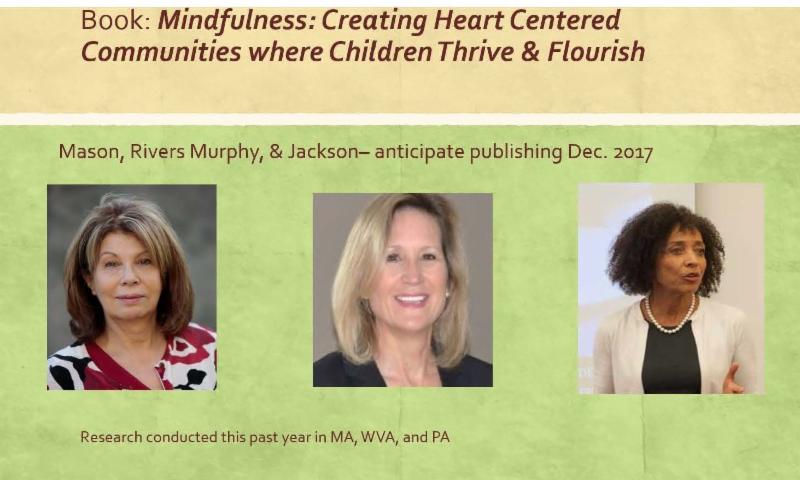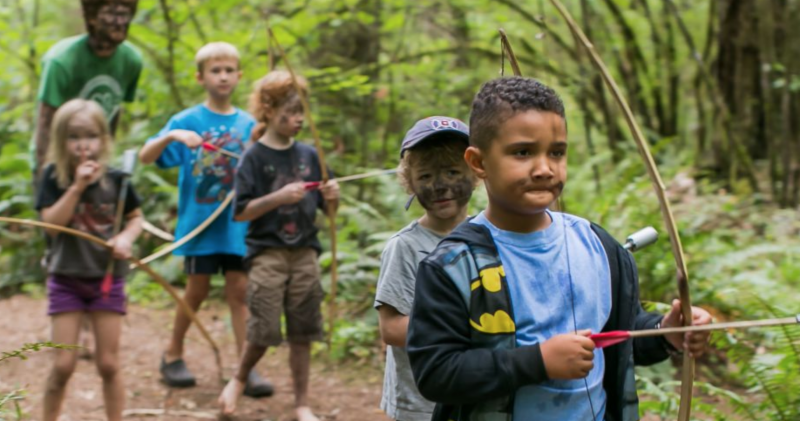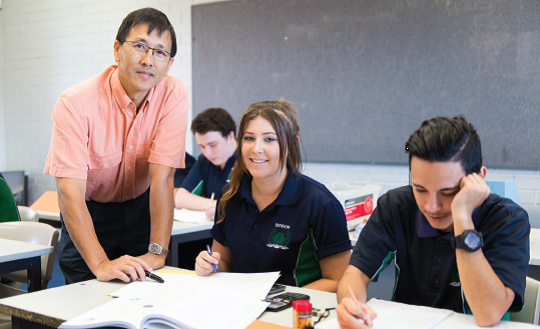|
in Syracuse New York
|
 |
|
|
|
 |
Dear Educators,
What could schools learn from summer camps? Are there teaching styles that might have lessons for schools? Consider student movement, engagement, and scheduling. The first two articles of this month's
Wow! highlight wilderness and improv camps. The third article this month continues our exploration of international education. In that article our readers are introduced to "invitational" education as it was implemented in Australia. We invite you, as you anticipate the joys of summer, to consider also the fun factor for your students. Unfortunately, equity issues are a concern - some camps are very expensive. As part of the second article we have included a few resource links to ways to lower the costs of camps.
|
 |
Curiosity, Survival and Outdoor Skills
By Grace Rubenstein, CEI Intern |
Is intellectual curiosity being punished in classrooms? We live in a fast-paced society where leisure is shunned and productivity maximized. It spills into the classroom in the form of standardized testing, rote memorization, and the like. Consequently, children are losing the characteristics that are essential to becoming lifelong learners, as their wonder and internal motivation are gradually replaced with external carrots and sticks. How do we overcome this results oriented system that punishes individuality and intellectual curiosity? I'll let you in on a well kept secret: the solution is right in your backyard. Mother Nature herself wields the remedy for the psychological and intellectual ailment I have described.
Benefits of Outdoor Education and Environmental Stewardship
If working at a nature day camp for upwards of four summers has taught me anything, it would be the immediate and lasting benefits of outdoor education. Up until this year, I worked each summer as an educator for
Portland Parks and Recreation's Nature Day Camp, which teaches themes in ecology and environmental stewardship, with a sprinkle of magic. Every day with nature camp with PPR is filled to the brim with nature games, crafts, and hiking. Most important, in my opinion, is the room for self-led exploration.
Campers are empowered to engage their imaginations and inquisitiveness, to familiarize themselves with nature on their own terms. For one child, that process may entail making fairy houses out of pine cones, leaves, and berries; for another, it may involve searching for owl pellets and trying to guess the identity of the unfortunate prey.

A week of PPR camp is held in one of Portland's many natural areas, such as
Hoyt Arboretum, a 189-acre collection of trees from around the world, and Mt. Tabor, a scenic city park atop a dormant volcano. Full day camps are available for children 5 through 12, with a half-day option for preschoolers as young as 3 ¾. Parents can sign their children up for a given age group, as well as a weekly theme. These themes, which range from Birds or Insects to Nature DIY, are geared towards helping campers learn ecology and appreciate the natural areas they get to experience. Staff plan creative crafts and games that incorporate those themes in fun and educational ways.
Make Believe - The Value of Sensory Input
I recall my group of 7-year-old campers having an absolute blast while playing a game that my coworker and I had designed. Because the weekly theme was related to insects, we wanted to teach them the typical life cycle of most insects: egg, then larva, then pupa, then finally adult. Watching them wobbling about the grass like tiny eggs, then squirming around like larvae, showed me how learning can and should be fun and multifaceted. To be perfectly honest, I myself had had trouble recalling the correct order of phases in insect life cycles---
was it pupa then larva, or the other way around? Not until creating and playing this game myself alongside my entertained campers did that knowledge finally cement itself in my brain.
A Child's Perspective
When I saw myself as a "teacher" who had to somehow imprint facts onto children, I was looking at my job through skewed "adult" lenses. Once I removed those lenses, and restored my sight to a child's perspective, I understood that I needed to explore and question the world alongside the campers, not for them. This philosophy of exploration is echoed in the other camp at which I have only just begun working. Earlier this month, I began my career at
Tracker's Earth in Portland, OR, a privately-run outdoor camp that incorporates traditional skills, wilderness survival, archery, magic, and so much more.
Children's Guilds at Camp
 One aspect that sets Trackers apart is the vast variety of different camps offered, which generally fall under different "Guilds": artisans, rangers, mariners, and Realms of Cascadia. These particular camps are geared for first through twelfth graders, with children 4-6 years old placed in our wonderful Rovers camp, which I will be leading this summer! Rovers get to do nearly everything the older kids do; by introducing and easing young children into activities like whittling and archery, which are often reserved for older ages, we show them that anything is possible for them to achieve.
Artisan, Rangers, Mariners and Realms of Cascadia Camps.
Parents of children entering 1st grade or higher can enroll their kids,depending upon their age, for a week of "artisan" camp, which develops tangible skills like archery, woodworking, ceramics, etc.); "rangers" camp, which emphasizes stealth, survival and tracking skills; mariners, which teaches water-related skills like kayaking and fishing; and lastly, Realms of Cascadia (Realms for short). Realms takes childhood imagination to an exciting level of realness as campers embark on adventures to save the forest from ominous forces in a role-play game come to life.
Artisans
|
Archery, woodworking, and Ceramics
|
| Rangers |
Stealth, survival and tracking skills |
| Mariners |
Kayaking and fishing |
| Realms of Cascadia |
Adventures to save the forest from ominous forces |
Trackers' Camps. At any of Trackers' camps, buses take the campers on daily field trips to both public parks and sites privately owned by Trackers. In comparison to most camps, even outdoor camps, Trackers gives children as young as the age of 4 the opportunity to help build a fire, learn archery, and carve with knives. Exposed to this heightened level of intensity and trust (with careful supervision), campers receive an experience unlike most others-- one that tests their capabilities in unique ways.
Risk-taking: Pushing to the Edge of Comfort
Campers of any age attending both Trackers Earth and PPR Nature Day Camp are pushed to the edge of their comfort zones. These programs strengthen the "
growth mindset" of learning, which rewards risk-taking and effort, while overriding the "fixed mindset," which values perfection and punishes failure. The "fixed mindset" is considered a byproduct of modern education styles, due to their reinforcement of undesirable thought patterns in students. A child who has adopted a "fixed mindset" blames their intrinsic characteristics for their successes and failures, and avoids challenges when he is convinced he is not intelligent or talented enough. Meanwhile, a child with a "growth mindset" credits her own effort and persistence for her achievements and failures, and thus is motivated to try anything new.
In both camps I have observed underlying philosophies that promote the growth mindset. With a staff of about one adult for every six to seven children, while children take risks, they are carefully supervised. Throughout my time at Parks and Recreation, I observed many of the same campers returning summer after summer, their open-mindedness towards trying new, intimidating, challenges having visibly grown. Trackers Earth does not fall short in this endeavor either, as is demonstrated in an impactful piece of wisdom constantly repeated as a mantra in Trackers Earth: "You're doing it wrong; do it better!" Applying to both camper and staff alike, this saying speaks volumes about the growth mindset attitude that seeps throughout all Trackers activities. Staff like myself are instructed to be open with their campers when encountering questions to which we do not know the answers, or skills we could develop further. This honesty helps children see the value in hard work, and the diminished importance of perfection. For example, I am a newcomer to building fires. Rather than pretend that I am great at something I have only just learned to do, I plan on telling them that I am still learning too! By revealing my excitement to explore new territory alongside them, I am showing my campers that it is okay to not be good at something yet!
 A key philosophy for both of the camps I have worked for is not to immediately provide answers before the students have the chance to discover a new thing on their own. For example, rather than immediately stating, "that tree was hit by lightning," I try to kindle their inquisitive minds with open-ended questions such as "What can you see/feel?" or "What do you think happened here?" The quality of knowledge my campers gather from that kind of interaction may not resemble textbook information, but the lasting effects on their critical thinking and their eagerness to understand the unknown are significant in their own ways.
A key philosophy for both of the camps I have worked for is not to immediately provide answers before the students have the chance to discover a new thing on their own. For example, rather than immediately stating, "that tree was hit by lightning," I try to kindle their inquisitive minds with open-ended questions such as "What can you see/feel?" or "What do you think happened here?" The quality of knowledge my campers gather from that kind of interaction may not resemble textbook information, but the lasting effects on their critical thinking and their eagerness to understand the unknown are significant in their own ways.
Implications for Schools
Children who are given the encouragement to develop their own unique relationship with the outdoors leave from camp with an amplified sense of creativity and passion for learning. They are inspired to see the world around them from a new light, igniting ideas and questions that may not have occurred to them. The result: An insatiable curiosity to know more, to see more, to never stop exploring.
Yes, schools need to meet standards for proficiency and growth at each grade level, but there is so much value in developing the students' inner worlds within that framework. If there is an option to take your class into a natural setting such as a forest, a park, or even a garden, anything you observe within that area can be explored. Get a few small magnifying glasses and allow the children to get themselves a bit dirty while searching for insects! Alternatively, send the children to each find their own secluded spot to sit in, and give them the task of documenting every little sensation, from what they hear and what they see, to what they smell and feel.
Sources
|
 I I |
Improv Summer Camps: Authentic Learning at its Core
By Nicole Colchete, CEI Intern |
 Teachers, what are your students doing this summer? There are a wealth of summer camp opportunities that some children will be accessing this summer. Many include options for improv or acting.
Here is one example from Austin Texas:
At the Hideout Camps kids learn the basics of improv, storytelling, and stagecraft mostly through playing games. Because you learn better when you are having fun! Every day they play games, create stories, perform scenes, do crafts and generally have a blast. On the final day they show off their amazing new skills in a performance for friends and family.
In Chicago, Hollywood, and Toronto, kids can participate in Second City Comedy Camps. These camps attract children from all over the world. The final session includes a performance for parents and the community. A variety of options are offered with discounts for siblings. For example:
- Mini-camps (for kids ages 6-7) meet for one week.
- Students rotate through two subjects:
Improv: An intro to the role of improv - saying yes, working together, having fun
Musical Improv: Learn to spontaneously put words to music
The Long Lake School for the Arts in New York (in the Adirondacks) offers 3-6 week overnight camps including options for comedy, drama, music, fine arts, dance, rock, magic, sports, and film. For this camp, 250 students, ages 8-16, from around the world share time together as they follow their individual schedules that they each created.
While Long Lake School is one of the more costly options, it is interesting to note some of the components of their programs:
- Individual schedules
- Held in a beautiful outdoor setting
- 16 separate studios
- Opportunities to learn with professionals
Equity is a Concern
While the above programs may sound wonderful, unfortunately, some of the options are costly. However, there are options. Some programs have cooperative agreements with school districts and some programs are offered through County Parks and Rec Programs. Some of the ways to lower summer camp costs include: scholarships, bartering, negotiating, and pro-rated time. The above website also includes information on free summer options such as free summer movies, free sports clinics, and free arts and crafts at museums.
More on Improv

Taking the Second City Model Abroad
Through performing and teaching improvisational theatre, I saw its benefits first hand. I had the opportunity to work with students in Greece for a year, as the School Counselor at Anatolia College, a middle and high school in Thessaloniki, Greece. Only Greek students attended my club, as the school is mostly Greek students. The school is a bilingual school, so I was able to teach the lessons in English
While this was a year-long program, the style of teaching could easily be part of an improv summer camp. Improvi-sational comedy:
- Can be extraordinarily therapeutic,
- Gives students a safe space to de-stress and "laugh their worries away."
- Increases student engagement and investment in their own learning.
As students learn improv, they may end up being more invested in their own learning.
I relied on The Second City's Guide to Improv in the Classroom, by Katherine S. Mcknight and Mary Scruggs as my primary resource to teach improv to students in Greece. This Guide was written by performers from the renowned improv theatre, Second City, in Chicago. This Guide became my handbook when developing an improv program for my students, as it beautifully and clearly described how to use improvisation to teach skills and facilitate learning for contemporary classrooms. While this book was the only material I had to use for my lesson plans, it turned out to be more than enough.
Improvisational Games
I taught students skills through different improvisational games, and I saw great success in engaging students through improv. As students became invested in the games and learning improv skills and concepts, they became vested in their own learning. A game that best demonstrates this idea is the
Ad Game
.
With the Ad Game
, students act as a creative advertising team, working together to sell a new product. In this game, I gave students a made-up product to advertise, and they would come up with a plan, slogan, and jingle for the product.
- For this game, every member of the group must propose an idea, and when an idea is proposed, every member must respond with "yes, that is a great idea" and build off of it.
- Since I would suggest a made-up product, such as a candy flavored blanket, there were no wrong answers in this fantasy world we are all creating together.
- Through this game, grounded in imagination, collaboration, and thinking on your feet, important learning skills were taught.
- This game is specifically geared towards building oral communication skills, team building, self-confidence, critical and creative problem solving, and idea generation.
Students benefited in numerous ways. The curriculum assigned the teacher to be a guide who works side-by-side with students and allows students to create, ask, and answer questions.
One girl came from a lower economic background than most other students and was bullied. Originally she clung to me and only wanted me to be her friend, but through the games I played with her, I gave her confident characters in status games. I also gave her funnier parts, which gave her positive affirmation from the other students. I saw her eventually become more proactive in reaching out and making friends with the other students.
How I helped students become comfortable with improv. I introduced the performance activities as games, so the students never saw it as putting on a performance. Instead, they viewed it as playing a game, so it didn't matter if some students were more comfortable with performing than others, because we were all playing together.
Using Improv as a Pedagogical Tool
How relevant is learning? What does it mean to learn authentically? The term authentic learning refers to students' perception that what they are learning in school is relevant to them and that they are learning key skills that will help them in the future. These learning skills include oral communication, empathy, self-awareness, creative problem-solving, and idea generation. These skills transcend subjects and are necessary for students' academic and personal growth.

My improv class allowed students to be active and engaged learners who demonstrate their growth through these improvisational comedy games. I found that students had grown immensely throughout the year, and this was evident in the feedback I received from them at the end of the year. I was amazed at the learning and life skills the students identified in their notes, as many of these skills are not skills I had formerly or directly taught them. These skills included: conflict resolution, coping mechanisms, positive thinking, and a "growth mindset." The result of my improv class showed me that teaching children through the arts not only fosters their creative development, but also teaches them important and valuable learning skills that can boosts their personal growth.
|
 |
School Transformation Made Simple with the Invitational Education Toolkit
By John Young, Principal, and Allyson Schoenlin, Chairman, Board of Trustees, International Alliance for Invitational Education with Christine Mason |
 Much of the school improvement research in recent times has focused on teaching specific strategies to accelerate student learning. In contrast, a new change management resource taps into changes in school climate, culture, and cultural proficiency to create welcoming environments that better address the social acceptance, engagement, and success of students. Based on theoretical research by William Pukey and John Novak (2016),
The Invitational Education Toolkit: Creating Positive Climates for Learning, Leading and Living builds on Pukey and Novak's three-prong platform: education in the democratic tradition of involving those who will be most impacted in decision making, understanding why people act by gaining an understanding of their perceptions, and realizing that individual behavior is impacted by individual beliefs about oneself.
Pukey and Novak in their
Introduction to Invitational Theory (2015) describe the educational importance of a democratic framework: "Democracy is a social ideal based on the conviction that all people matter and can grow through participation in self-governance." (2016, p.2). Benefits, according to the authors, include increased tolerance, increased student engagement, improved graduation rates, and decreased bullying and anxiety.
The Toolkit provides a theoretical foundation for effective school reform and a cultural framework for change. It is primarily a guide to bring stakeholders together to analyze and improve five domains in every organization: people, places, programs, policies, and processes. The Toolkit provides a
12-step path to school transformation beginning with initial exposure to concepts and ideas and relevant dialogue and proceeding to systematic application, leadership development, school adoption, and ultimately sustainability and school transformation.
During the first phase, volunteers try out strategies from the Toolkit to become a more welcoming and inviting school environment. During systematic application, staff share ideas and resources to reach consensus about cultural changes within their school. During the third and final phases, flexibility and local adaptation are key to growing leadership and support.
With the Invitational Education model, flexibility and local adaptation are essential. There is no prescribed time to complete a Step or a Phase of growth. Each school sets its own pace. The benefits of Invitational Education cited in the Toolkit are increased engagement, attendance, graduation, achievement, with decreased bullying and anxiety.
Invitational Education in Australia
At Clarkson Community High School in Western Australia, teachers promote Invitational Education as a key part of the students' learning journey.
- We actively encourage all people to be intentionally inviting.
- Our aim is to create, maintain and enhance human environments that invite students, families and staff to realize their potential.
The intentionality of the Invitational stance at Clarkson has delivered tangible improvements. Our choices regarding programs, people, places, policies and processes have resulted in very positive academic gains in NAPLAN testing in Years 7 and 9. At Clarkson, students' achievement data in 2016 clearly show progress in numeracy at 1.8 standard deviations - a significant effect size. 'Very high' achievement is twofold better than 'like schools' and lightly fewer than half the students are below 'very low' and 'low progress.'
The I.E. Toolkit is published online by IAIE and housed on the
IAIE website. It is intentionally designed to help a local facilitator lead site based training without hiring a consultant. Each PowerPoint Step comes with a set of detailed facilitation notes. Every Step also includes a brief video by varied international practitioners who reinforce the content.
Editor's Note: This article is adapted from an article that first appeared in the Australian Journal, Education Today, Term 1 2017.
References
Pukey, W., & Novak, J. (2016).
The Invitational Education Toolkit: Creating positive climates for learning, leading and living.
|
|
Risks and Rewards
Is there something to be said for risk taking? I attended a workshop on Outdoor Play and Risk Taking last week and will be writing more about this during the next year.
Whether the risk be one of learning something new, calling up courage to handle a potentially dangerous situation, or the risk of performing in front of your peers, we all have opportunities to take risks. With outdoor wilderness experiences and improv, the risks students take are guided by adults. Yet even with that guidance, risk-taking can be exhilarating and even transforming
What are the take-aways for your classrooms and your schools?
Sincerely,
Christine Mason
Center for Educational Improvement |
|
|